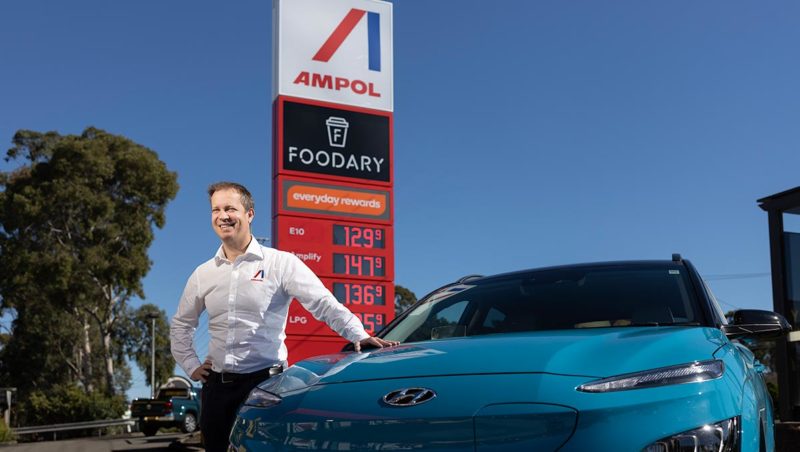Australian petrol retailer Ampol will look to expand its offering of electric vehicle charging services and pilot the production of renewable hydrogen, in the first stage of a new decarbonisation strategy. But the company still expects to be selling petrol fuels well into the second half of the century.
As part of a Future Energy and Decarbonisation Strategy announced by Ampol on Thursday, just days after the federal government announced a $2.4 billion package to ensure Australia’s two remaining oil refineries stay open, Ampol says it will roll out some more electric vehicle charging infrastructure and some hydrogen refuelling stations.
Ampol, which until recently was branded as Caltex Australia, operates more than 1,900 sites across Australia and announced on Thursday that it had committed to achieving zero net operational emissions by 2040.
This will see the company slash emissions from its own fuel refining operations and those relating to its service stations, but the commitment does not extend to the emissions embedded in the fuels it sells to drivers.
Through the new decarbonisation strategy, Ampol said that it would target a $100 million spend out to 2025 in new sustainability measures, including the deployment of solar and storage at a number of its existing service stations, a renewable hydrogen production pilot and the growth of its electric vehicle charging network.
The company still expects to be a producer and retailer of fossil fuel products at the time, projecting that under a ‘status quo’ scenario, electric vehicles will have reached 50 per cent penetration by 2050, and under a more ambitious scenario aligned with limiting global warming to just 2 degrees, electric vehicle uptake could reach 72 per cent.
It is important to note that the International Energy Agency, in its latest report on what’s needed for a 1.5°C scenario, says sales of new petrol and diesel cars must end by 2035.
Ampol, though, expects demand for oil products to remain ‘robust’, and predicts that a transition away from fossil fuels for transport will happen at a much slower rate than that currently underway in the electricity sector.
The new decarbonisation strategy forms part of Ampol’s marketing plan to achieving zero net ‘operational’ emissions by 2040.
The company’s ‘operational’ emissions make up just 2 per cent of its overall emissions footprint, with the emissions created through the combustion of the fuels produced and sold by Ampol, its scope-3 emissions, representing a substantially larger footprint.

The company has previously partnered with Evie Networks to trial the installation of ten ultra-fast charging stations at a number of its retail sites and said that it would look to establish its own network of charging stations. An additional two fast charging stations will be added to service stations in Cockburn and Werribee this year.
Ampol CEO Matt Halliday said that the company’s established position in the Australian market for transport fuels meant that it was ideally placed to transition to repurpose its existing infrastructure, such as service stations, to serve a future market dominated by zero emissions vehicles.
“Ampol is uniquely positioned to play a key role in energy transition. Our integrated supply chain capabilities and privileged assets, Australian brand, customer relationships and industry knowledge, when combined with our financial strength, set us apart from our competitors and will put us at the forefront of building new energy solutions to support change across major parts of the Australian economy,” Halliday said
“The flexibility to repurpose our market leading infrastructure and distribution networks for multiple uses will support the most efficient pathway for our customers’ decarbonisation ambitions and underpins our competitive advantage to participate in new energy opportunities.”
Ampol recently secured federal government funding to keep its fuel refinery, located in Lytton in Queensland, open until at least 2030. The funding will be provided as part of a $2.3 billion package that will prop up Australia’s last two major fuel refineries – along with Viva Energy’s refinery in Geelong – that struggling to remain viable as a result of competition from international suppliers.


